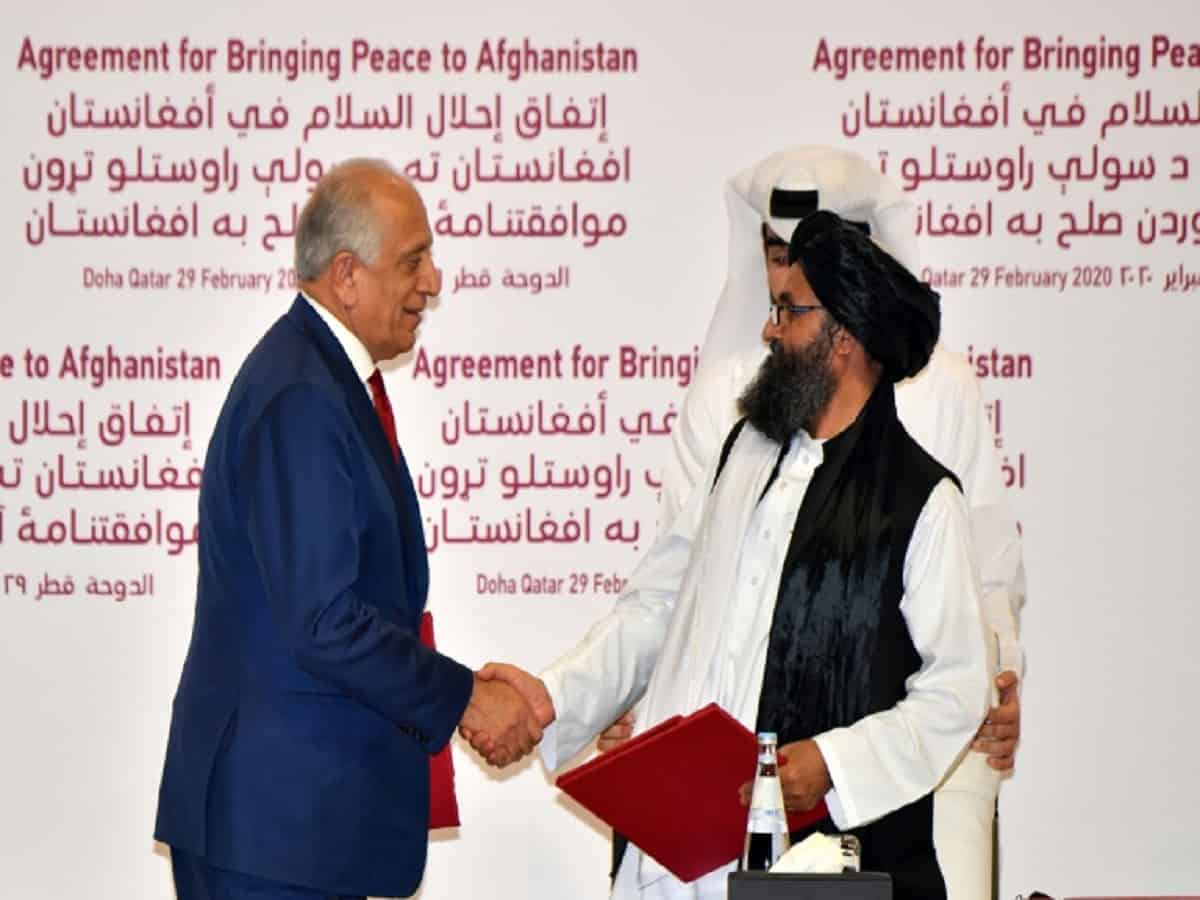Doha: United States signed a landmark deal with the Taliban on Saturday, laying out a timetable for a full troop withdrawal from Afghanistan within 14 months as it seeks an exit from its longest war.
The agreement is expected to lead to a dialogue between the Taliban and the Kabul government that, if successful, could ultimately see an end to the grinding 18-year conflict.
Taliban fighter-turned-dealmaker Mullah Baradar signed the accord alongside Washington’s chief negotiator Zalmay Khalilzad, in a conference room in a luxury hotel in the Qatari capital.
The pair then shook hands, as people in the room shouted “Allahu Akbar” (God is greatest).
US Secretary of State Mike Pompeo looked on as the two inked the deal, and alluded to the difficult work that remains to be done.
“I know there will be a temptation to declare victory, but victory for Afghans will only be achieved when they can live in peace and prosper,” he said.
1996 -2020
The Taliban swept to power in 1996 with a hardline interpretation of Islamic sharia law, banning women from working, closing girls’ schools, and forbidding music and other entertainment.
Since the US-led invasion that ousted them after the September 11, 2001 attacks, America has spent more than $1 trillion on fighting and rebuilding in the country.
About 2,400 US soldiers have been killed, along with unknown tens of thousands of Afghan troops, Taliban fighters and Afghan civilians.
“We’re seizing the best opportunity for peace in a generation,” Pompeo told a press conference.
‘Powerful path,’ says Trump
President Donald Trump, who has promised to finish America’s “endless wars”, urged the Afghan people to embrace the chance for a new future.
“If the Taliban and the government of Afghanistan live up to these commitments, we will have a powerful path forward to end the war in Afghanistan and bring our troops home,” he said on the eve of the signing.
The Taliban’s chief negotiator Sher Mohammad Abbas Stanikzai hailed another “day of victory” in Afghanistan’s long history of repelling foreign powers.
“This is the kind of day that our ancestors celebrated after they defeated the British and the Soviets,” he said as he and other jubilant Taliban members took part in a march in Qatar, in a video shared by Taliban sources.
Afghanistan Government
The Doha accord was drafted over a tempestuous year of dialogue marked by the abrupt cancellation of the effort by Trump in September.
But the position of the Afghan government, which has been excluded from direct US-Taliban talks, remains unclear and the country is gripped by a fresh political crisis amid contested election results.
The signing comes after a week-long, partial truce that has mostly held across Afghanistan, aimed at building confidence between the warring parties and showing the Taliban can control their forces.
Troops to be withdrawn in 14 months
The US, which currently has between 12,000 and 13,000 troops in Afghanistan, will draw that number down to 8,600 within months of the agreement being signed.
If the Taliban abide by the terms of the accord, the US and its partners “will complete withdrawal of all remaining forces from Afghanistan” within 14 months.
The two sides also agreed to swap thousands of prisoners in a “confidence building measure”.
And the unprecedented direct negotiations between the Taliban and Afghanistan’s government will begin by March 10, likely in Oslo, senior US officials said.
First step to lasting peace
NATO Secretary General Jens Stoltenberg heralded the agreement as a “first step to lasting peace”.
“The way to peace is long and hard. We have to be prepared for setbacks, spoilers, there is no easy way to peace but this is an important first step,” the Norwegian former prime minister told reporters in Kabul.
The insurgents said they had halted all hostilities Saturday in honour of the agreement.
“Since the deal is being signed today, and our people are happy and celebrating it, we have halted all our military operations across the country,” Taliban spokesman Zabihullah Mujahid told AFP.
Any insurgent pledge to guarantee Afghanistan is never again used by jihadist movements such as Al-Qaeda and the Islamic State group to plot attacks abroad will be key to the deal’s viability.
The Taliban’s sheltering of Al-Qaeda was the main reason for the US invasion following the 9/11 attacks.
The group, which had risen to power in the 1990s in the chaos of civil war, suffered a swift defeat at the hands of the US and its allies. They retreated before re-emerging to lead a deadly insurgency against the new government in Kabul.
After the NATO combat mission ended in December 2014, the bulk of Western forces withdrew from the country, leaving it in an increasingly precarious position.
While Afghans are eager to see an end to the violence, experts say any prospective peace will depend on the outcome of the intra-Afghan talks.
But with President Ashraf Ghani and rival Abdullah Abdullah at loggerheads over contested election results, few expect the pair to present a united front, unlike the Taliban, who would then be in a position to take the upper hand in negotiations.

